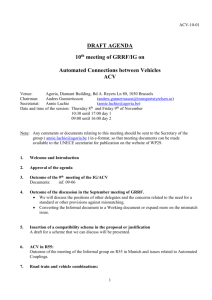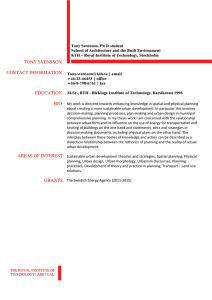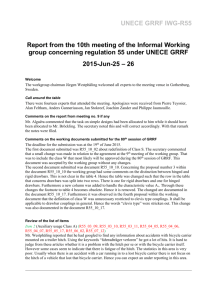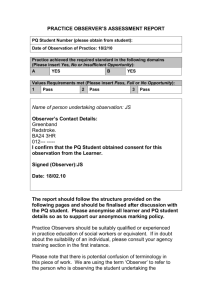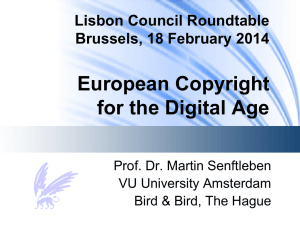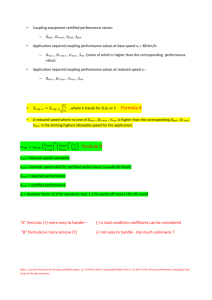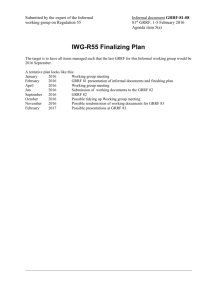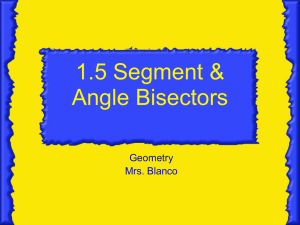Brevmall VBG Truck Equipment engelsk
advertisement
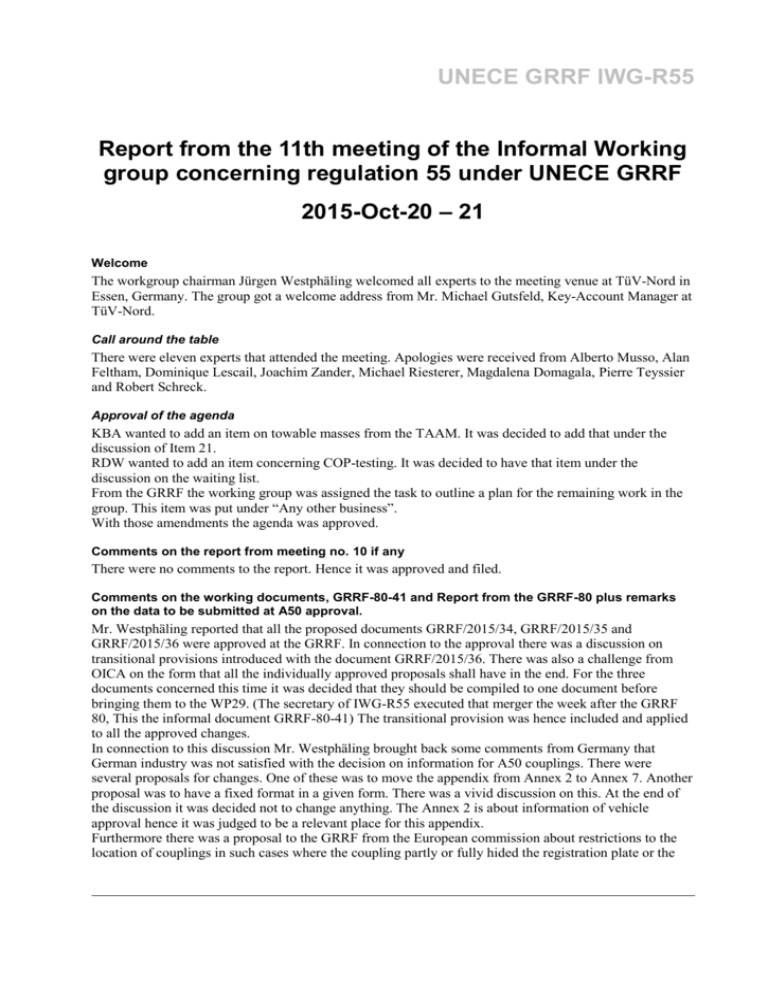
UNECE GRRF IWG-R55 Report from the 11th meeting of the Informal Working group concerning regulation 55 under UNECE GRRF 2015-Oct-20 – 21 Welcome The workgroup chairman Jürgen Westphäling welcomed all experts to the meeting venue at TüV-Nord in Essen, Germany. The group got a welcome address from Mr. Michael Gutsfeld, Key-Account Manager at TüV-Nord. Call around the table There were eleven experts that attended the meeting. Apologies were received from Alberto Musso, Alan Feltham, Dominique Lescail, Joachim Zander, Michael Riesterer, Magdalena Domagala, Pierre Teyssier and Robert Schreck. Approval of the agenda KBA wanted to add an item on towable masses from the TAAM. It was decided to add that under the discussion of Item 21. RDW wanted to add an item concerning COP-testing. It was decided to have that item under the discussion on the waiting list. From the GRRF the working group was assigned the task to outline a plan for the remaining work in the group. This item was put under “Any other business”. With those amendments the agenda was approved. Comments on the report from meeting no. 10 if any There were no comments to the report. Hence it was approved and filed. Comments on the working documents, GRRF-80-41 and Report from the GRRF-80 plus remarks on the data to be submitted at A50 approval. Mr. Westphäling reported that all the proposed documents GRRF/2015/34, GRRF/2015/35 and GRRF/2015/36 were approved at the GRRF. In connection to the approval there was a discussion on transitional provisions introduced with the document GRRF/2015/36. There was also a challenge from OICA on the form that all the individually approved proposals shall have in the end. For the three documents concerned this time it was decided that they should be compiled to one document before bringing them to the WP29. (The secretary of IWG-R55 executed that merger the week after the GRRF 80, This the informal document GRRF-80-41) The transitional provision was hence included and applied to all the approved changes. In connection to this discussion Mr. Westphäling brought back some comments from Germany that German industry was not satisfied with the decision on information for A50 couplings. There were several proposals for changes. One of these was to move the appendix from Annex 2 to Annex 7. Another proposal was to have a fixed format in a given form. There was a vivid discussion on this. At the end of the discussion it was decided not to change anything. The Annex 2 is about information of vehicle approval hence it was judged to be a relevant place for this appendix. Furthermore there was a proposal to the GRRF from the European commission about restrictions to the location of couplings in such cases where the coupling partly or fully hided the registration plate or the UNECE GRRF IWG-R55 fog light. This proposal was not approved by the GRRF. Finally there was a discussion at the GRRF about the work plan and the time left for the IWG-R55. Among other things the progress and the shape of the Agricultural regulations for coupling was brought up. As a result of this discussion the chair of GRRF assigned the IWG-R55 to outline a plan for the remaining work. Review of the list of items Item 2 (Auxiliary usage Class A) (R55_03_09, R55_03_10, R55_03_11, R55_04_05, R55_04_06, R55_04_07, R55_05_17, R55_06_02, R55_07_12) Mr. Westphäling reported that the work at DIN that he had earlier talked about had at 2015 Oct 16 resulted in an agreed draft standard for load carrier to be used in connection with trailer balls i.e. A50. Taking part in this work are appliance manufacturers, universities, caravan manufacturers and technical services. This draft does not address the interface to the coupling ball. That standardization work is yet to start. According to Mr. Westphäling this is a high priority item. The risk with having the auxiliary loads increasing and no control over the coupling ball is large. Just a product at the lower end of the tolerance band of the throat diameter is substantially worse than one at the upper limit. Mr. Westphäling further reported that he found A50 couplings approved in Poland without a D-value. Situation is chaotic. Following the road map to wait for DIN and then ISO would take some four years until there is anything of substance to improve the current situation. Other delegates noted that some OEM:s already apply Carlos-BC testing to safeguard their designs to some extent. Comparisons were also made to the situation with cranes where are diagrams showing how the crane could be loaded at different horizontal distances from the base. Further comments were also made on the mechanical interface and some existing proposals that are designed to put most of bending moment away from the throat of the ball. The time frame of four years and maybe even longer seems too long and some experts asked for some interim solution with simple rules. It was decided to await any new proposals from the experts to the next meeting. If there are no new proposal the item will be put on ice for future actions. Next meeting Item 14 (2nd stage built) (R55_06_02) Mr. Westphäling reported that “Space extender” (produced and marked by the company SMV) has set out 30 vehicles for field test. http://www.spaceextender.com/ Up to the present time no reports on the findings from the field tests are available. Further Mr. Westphäling reported that the design by Lohr for car carriers has been tested and approved as class F coupling equipment. Mr. Westphäling showed pictures from tests on a test bench with similar installation from another manufacturer. Through 7 tests it has not been successful due to the cracking of the fixture. I.e. the fixture design is a critical point. On the other hand tis leads back to the definition of what is coupling equipment and what is chassis extension. Mr. Tagliaferri showed some pictures of a truck frame with a recess aft of the last axle such that the last ~1,5 m of the frame was one frame height lower than the rest of the frame. At the rear end of that lower frame a underrun protection and a coupling was mounted. The question was: “is the lower part of the frame coupling equipment or part of the chassis?” The discussion on this was vivid. Some parts of the discussion had the flavor of that the answer to that question depends on the reputation of the 2nd stage manufacturer making the changes to the chassis. Many experts found this unsatisfactory. It was argued that such large changes to the chassis shall not be made without a thorough dialog with and a following consent from the OEM. Mr. Svensson was in this context assigned the task to approach OICA for advice on this matter. Next meeting UNECE GRRF IWG-R55 Item 20 (Heavy transports) (R55_02_13, R55_04_08, R55_04_12, R55_05_01, R55_05_06, R55_05_20, R55_05_21, R55_05_22, R55_07_18, R55-08-13, R55_09_06, R55_10_08; R55_10_09; R55_10_13) Mr. Svensson had at the 10th meeting (R55-10-08) elaborated a proposal to handle the speed dependence of coupling performance requirements. This is one possible way to handle heavy transports. At previous meetings the German TA31 way (now in TüV merkblatt) has been up for discussion (R55-05-06) Some comments were given about the current state of affairs. Mr. Tagliaferri and Mr. Svensson expressed their support for a speed dependent adaptation of the requirement. Mr. Werner proposed to have the base speed in the linearformula propsed set to 90 kmph rther than 80 kmph Mr. Matyas commented that off-road applications could result in high forces. However Mr. Svensson assumed that these transports are probably not aimed at off-road applications. If and when we agree on a proposal perhaps off-road applications could be excluded from the application. Mr. Alguëra commented in favor of some dynamic factor to be applied without saying anything about what would be his preference. However Jost has over time applied some requirements reduction as a function of reduced speed. Traditionally Orlandi has applied an old CUNA regulation for gross combination mass of 250 tonnes to 500 tonnes. It was decided to distribute “TA31” formula to the experts. (instead of distributing this formula the experts are recommended to study the document R55-05-06. The first D-value formula in that document is valid from GCM 48 tonnes and ascending. Take then a look at the diagram at the bottom of the document. The blue graph illustrates the “TA31” function. ) The experts were asked to consider this item until next meeting. Next meeting Item 21 (Limiting cases for the usage of certified characteristic values) (R55_04_11, R55_05_05, R55_06_09, R55_07_06, R55_07_14, R55-08-03, R55-08-04, R55-08-05, R55_09_04, R55_09_05, R55_09_11, R55_09_ 13, R55_10_03: R55_10_04; R55_10_05; R55_10_06; R55_10_07; R55_10_08; R55_10_15, R55_11_ 12; R55_11_13; R55_11_15 ) At the previous meeting Mr. Westphäling took on the task to get more measurement data to this case. Unfortunately he had had no success in this mission. However Mr. Svensson argued that there were enough measured data already. In order to support the discussion on this item Mr. Svensson had made a survey of the history of this item going all the way back to the first initiatives in the ISO working group concerned. The different initiatives were summarized in the document R55-11-12. It turns out that the item started in the ISO working group in 2001. I.e. the background to the proposal is very well scrutinized. Mr. Matyas observed that from the BPW perspective the Australian road conditions are very servere and worse than in Germany. Mr. Westphäling argued that it was rather the German traffic rhythm with frequent braking and acceleration that was making conditions in Germany worse for the coupling. To that Mr. Svensson pointed to all measurements done in recent years showing that the traction and braking related forces are not those that are the highest. Rather this is the forces related to the road profile and the interaction with the geometry of the vehicle combinations. I.e. it might be true that the braking and accelerations are more frequent in Germany than Australia. However this does not in a significant way influence the life of the coupling equipment as those related forces are low. After a long discussion it was agreed that the proposal from the document R55-10-08 shall with respect to the multi vehicle combinations be turned in to an informal document to the GRRF-81 in February 2016. In doing so the sections for trade-off and speed dependence shall be separated. The experts were urged to scrutinize the informal document that shall be review at our next meeting to be held in January of 2016. Next meeting Item 25 (Articulation angles as installed) (R55_02_05, R55_05_13, R55_07_10, R55-09-21) Mr. Stokreef presented the proposal based on a review of several relevant standards. Some comments were given. A proposed articulation angle limit for drawbar coupling around a vertical axle through the coupling point was proposed to be 60 degrees. This was considered to be too low. Rather a limit of 90 UNECE GRRF IWG-R55 degrees was recommended. For fifth wheel couplings the limits for pitching angles was recommended to be set to +6/-7 degrees. Mr. Stokreef will prepare a proposal for an informal document to the next meeting. The experts shall to that meeting have considered the angles recommended at this meeting. Next meeting. Item 29 (Drawbar a separate technical unit) (R55_04_04, R55_05_02, R55_09_08; R55_10_xx; R55_11_03; R55_11_08) Mr. Bröckling had prior to the meeting sent in the document R55_11_08. Unfortunately this was not discussed. There have been many proposals under this item before. Mr. Bröckling has proposed “A drawbar is always a separate technical unit”. This was up in the discussion also this time as was the ISO7641. No agreement was reached. Any initiative to the next meeting is awaited and welcomed. Next meeting Item 30 (Simple designs) (R55_02_09, R55_03_06, R55_05_09, R55_07_07, R55_09_08; R55_11_03; R55_11_08) Having decided whether we are dealing with a separate technical unit or not, we are faced with the issue whether the design is simple or not. This issue is about having the option to have a calculation based approval or not. At the last meeting Mr. Svensson argued that the basic assumption have to be that an equipment approved based on calculation shall withstand a physical fatigue test if arranged. This is also supported by R55 Annex 6 § 1.1. At the same meeting Mr. Svensson also argued that there need at least to exist an agreed calculation procedure. To this meeting he had supplied document R55_11_03 which is a well-documented and maintained design standard that is freely available. In addition Mr. Bröckling had supplied document R55_11_08. Neither of those proposals were considered at any depth. Mr Westphäling argued that the designs concerned are so simple that even a first year student can make the calculation. Mr. Svensson then argued that it would be easy for the technical services to come together to draft a calculation procedure proposal. This was not accepted as “you would not like to disclose some calculation secrets”. At the last meeting Mr. Svensson offered to fatigue test two drawbars that are approved based on calculations. Mr. Westphäling was of the opinion that this was not needed. Instead he proposed that a truly simple structure like a RHS profile bar should be set up according to his instructions and compared to calculations in a static test. According to Mr. Svensson this is not relevant. He repeated the offer from the last meeting that still remains. No agreement was reached. Next meeting The waiting list According to the discussion on the future of this informal working group the waiting list items are activated. Item w1 (Approval based on worst case class B50x)(R55-07-19; R55_11_14) Mrs. Domagala was not present but had sent in a document R55_11_14. This document was discussed. It was agreed that the proposal was not bringing any improvement. The current text of the regulation R55 Annex 6 §1.1. is sufficiently clear allowing caculations as a tool to identify worst case(s). Item w13 Mr. Stokreef proposed to make a review of the COP testing requirements. Based on an observation that the test set up influences the test results he asked whether it was appropriate to lower the test force by COP testing. This started a lot of discussions. One statement that came from different experts was that a successful fatigue test for type approval might be just a lucky coincidence. From such a perspective Mr. Svensson argued that the COP-testing shall be performed at the same level as the approval test. Over time such a procedure would disclose any “lucky coincidence”. In this context Mr. Svensson asked the experts how the COP-testing would be carried out for components that were approved based on calculations. After some thinking Mr. Westphäling responded that the safety margin in the UNECE GRRF IWG-R55 calculation based approvals are so high that no COP testing is needed. To that Mr. Svensson reminded that the offer to test two drawbars still remains. The discussion did not end in a conclusion other than that Mr. Stokreef should reassess the basis for the proposal and outline a proposal for an informal document on the subject until next meeting. Item w11 (Masses)( R55_11_18) Mr. Hansen had got a task from the TAAM meeting to bring up for discussion a matter of how to decide towable mass and what masses to use in the calculation of required performance for the coupling equipment. This was not discussed to any detail. Due to lack of time and poor preparation by the secretary the remaining items were left to be processed later meetings. Report from TFAC Since last meeting there had been an exchange of documents between Mr. Schauer and Mr. Svensson. Among these documents were first of all reformatted documents. There were also examples of a separate regulation and fully integrated regulations. During the GRRF-80 based on discussions with Mr. Schauer Mr. Westphäling announced that the agricultural regulation might not be finished within the time frame of the IWG-R55. There was also an inclination to have the agricultural regulation as a separate regulation R55A. At this meeting the questions was raised whether the Agricultural regulation shall be a separate regulation that should be administered by a new working group. The experts decided that that should be the recommendation from IWG-R55. Approach towards the 80th session of the GRRF It was agreed that we shall approach the GRRF-81 with informal documents. The final versions of those documents shall be agreed at our next meeting prior to the GRRF-81. Furthermore we shall present a plan for the finish of the work of the working group. This plan was requested at the GRRF-80. Documents to the next informal meeting shall be made available to the secretary at the latest 4 week before the meeting. New Items to the waiting list (R55-11-23) 1. SPP_Proposal_Application for approval_2014_05_ a. SPP_Proposal_Application for approval_2013_05 2. SPP_Proposal_Conformity of production_2013_10 3. KBA Change request_UN ECE R55_2. Definitions_alternative values 4. KBA Change request_UN ECE R55_Annex 6_3.7.2.2_lever bearing at least 1,0... 5. KBA Change request_UN ECE R55_Annex 7_T = 32 t 6. JOST_Application for an amendment of R55-Jost-06-10-2014 7. KBA Change request_UN ECE R55_2 Definitions_Class H50 (R55_09_07-…) 8. Orlandi, Diagram correction wedge (R55_09_20-Wedge) 9. Fixing point information and vehicles N1 10. General review Class …-X 11. What masses to use when calculating required performance values for coupling equipment. UNECE GRRF IWG-R55 12. COP testing requirement Any other business Next meeting will be a two-day meeting to be held in the Paris. Mr. Preud´homme arranges the details. Venue will be communicated at a later stage. The time for the meeting is 2016 January 14 - 15 starting at 1000 ending at 1200 hours. It was noted that the target is to have all items managed such that the last GRRF for this Informal working group would be 2016 September. A tentative plan looks like this: January 2016 Working group meeting February 2016 GRRF 81 presentation of informal documents and finishing plan April 2016 Working group meeting Jun 2016 Submission of working documents to the GRRF 82 September 2016 GRRF 82 October 2016 Possible tidying up Working group meeting November 2016 Possible resubmission of working documents for GRRF 83 February 2017 Possible presentations at GRRF 83 Close of the meeting The chairman thanked all participating experts for their contribution and wished them a safe journey home. Welcome back in January of 2016. The attendees expressed their gratitude for the hospitality by the TÜV-Nord to host the meeting. Resolutions and actions No. 1 2 3 4 5 6 7 8 9 10 11 Description Item list in ToR extended with two items. 29. Integrated drawbar, 30. Simple drawbar The German TA 31 sent to the secretary TûV-Nord procedure on rigid drawbars sent to the secretary Invite Lucien Vogel of Lohr to the group Invite German trailer manufacturers to the group Invite other trailer manufacturers through CLCCR Invite representatives from UTAC to the group Investigate further experts to the agricultural subgroup Item 6, Collect further information on locking of foldable class A couplings Item 7, In principle agreed but formulation shall be reconsidered. Item 8, Agreed without modifications Time 2012 Oct 11 Actor Svensson Closed Yes 2012 Oct 11 2012 Oct 11 Conrad Conrad Yes 2012 Oct 11 2012 Oct 11 Preud´homme Westphäling Yes Yes 2012 Oct 11 Svensson Yes 2012 Oct 11 Preud´homme Yes 2012 Oct 11 All Yes 2012 Oct 11 van Ittersum Yes 2012 Oct 11 Westphäling, Stokreef Yes 2012 Oct 11 Yes UNECE GRRF IWG-R55 12 13 14 15 16 17 18 19 20 21 22 23 24 25 26 27 28 29 30 31 Item 10, No agreement reached, reclassified as complex. Item 11, Proposal agreed in principle. Mr. Teyssier of Volvo volunteered to reconsider the formulation. Mr. Tagliaferri offered his support. Item 12, The drawings proposed needed improvement. The justification is required to be better founded in the statistics. Item 17, Agreed Item 18, Proposal was agreed. The formulation does cover fully automatic coupling systems. Item 23, Proposal disagreed and withdrawn Item 22, Proposal supported and Mr. Svensson was assigned the task to elaborate the proposal Item 2, No agreement was reached at this time more information on accident statistics needed Item 2, AL-KO to send internal procedure to Mr. Westphäling Item 2, TÜV-Rheinland to send internal procedure to Westphäling Item 2, Try to get documentation on the Dutch automobile club procedures and send to Westphäling Item 13, Support but further information wanted. Contact Mr. Bonacker for more background. Item 3, Proposal in principle agreed. More information on mechanism required. Westphäling contacts DLG. Svensson contacts Mr. Bonacker. Item 4, Pommier is invited to outline a new class L2 intended for use with pin type couplings with cylindrical (prismatic) pin. Items agreed at the 2012 Oct 10-11 will be formalized in a working document for the GRRF session 2013 Feb Next meeting to be held in Garching 2013 Jan 15-16 Italian UNACOMA to prepare a proposal for agricultural couplings Simple items will go in the current series of amendments. No transition period needed for the simple items Handle both ball and pin couplings in the context of secondary coupling. New proposal. 2012 Oct 11 Decided Yes 2012 Oct 11 Teyssier, Tagliaferri YES 2012 Oct 11 Zander Yes 2012 Oct 11 2012 Oct 11 Yes Yes 2012 Oct 11 2012 Oct 11 Svensson Yes Yes 2012 Oct 11 Westphäling Yes 2012 Oct 11 Jaumouille YES 2012 Oct 11 ? 2012 Oct 11 Stokreef 2012 Oct 11 Svensson Yes 2012 Oct 11 Westphäling, Svensson (Challenge to all experts) Preud´homme Yes Westphäling, Svensson Yes 2012 Oct 11 2012 Oct 11 2012 Oct 11 YES Yes 2013 Jan 16 Westphäling Yes 2013 Jan 16 Decided Yes 2013 Jan 16 Decided Yes 2013 Jan 16 Westphäling Yes UNECE GRRF IWG-R55 32 Introduce clevis in the definition of Class C clearing out ambiguities. New proposal Further detail the requirement for remote indication. New proposals. Distribute new sketches on free space definition. Comment on the new sketches for free space Proposal for item 17 adjusted Further elaborate on the trade-off proposal, aiming for a straight line Send the German documented procedure FS5 to the secretary Start outline requirements for auxiliary usage of coupling equipment. Supply information on force level from coupling brakes. 2013 Jan 16 Westphäling Yes 2013 Jan 16 YES 2013 Jan 16 2013 Jan 16 2013 Jan 16 Tagliaferri, Teyssier Westphäling, Alguëra All Decided Turlier, Svensson 2013 Jan 16 Westphäling 2013 Jan 16 van Ittersum YES 2013 Jan 16 Yes Investigate the outcome from the changed rules for drawbar lateral forces in NewZeeland Coupling in existing classes developed to become fully automatic coupling remain in the original class. Outline a new Class W for coupling systems of unique concept. Draw on the Class T when outlining the definition Review Annex 7 §1.5.2 Investigate and compile statistics concerning king-pin and supporting structure in semitrailers. 2013 Jan 16 Turlier, van Ittersum, Preud´home, Westphäling, Jaumouille Svensson 2013 Jan 16 Decided Yes 2013 Jan 16 Svensson, Gunneriusson Yes 2013 Jan 16 2013 Jan 16 Yes YES 46 Investigate and compile information on limiting articulation angles for coupling equipment as installed on the vehicles 2013 Jan 16 47 Item 2, Put the ISO15263DIS and French experimental standard XPR-18-904-4 side by side and try to extract relevant parts. Item 2, Contact Mr. Pierre Martin of BNA to get some background information to the ISO15263 work failing. Item 4, Outline a proposal including the test conditions for applications of class L drawbar eyes with pin couplings. Item 5, Finalize a proposal text for Class W 2013 Apr 12 Algüera Stokreef, Hansen, Gunneriusson, Bailey,Preud´home, Tagliaferri Stokreef, Hansen, Gunneriusson, Bailey,Turlier, Erario/Tagliaferri van Ittersum 33 34 35 36 37 38 39 40 41 42 43 44 45 48 49 50 2013 Jan 16 YES YES Yes YES Yes YES 2013 Apr 12 Preud’homme, Westphäling 2013 Apr 12 Preud´homme YES 2013 Apr 12 Stokreef, Svensson YES UNECE GRRF IWG-R55 51 Item 7, Check-up whether there are anything in the French law that makes an integrated approval of coupling and drawbeam impossible. 2013 Apr 12 Lescail 52 Item 11, Communicate with the OEM about the implementation of indication in the instrument cluster. Consider also monochrome options. Item 13, Outline an alternative regulation text/requirements for lateral force performance of drawbars. Item 14, Cancelled from the item list Item 20, Investigate the UNECE R54 (tyres) for the consideration of speed there in. Item 20, Investigate how axle manufacturers treat axle load an reduced speed. Item 20, A procedure used for a long time by VBG shall be applied a posteriori to historic certificates or recommendations issued by other manufacturers, Jost/Rockinger, Pommier, Orlandi, SAF/Holland Item 20, Make a try to see how the Germans procedure of TA31 and the provisions in the CARLOS-testing could be integrated in to the regulation 55 Item 22, Outline a regulation text proposal to incorporate Dc vs. V trade-off Item 24, Contact CLCCR-TC concerning rubbing plate deformations and any damage caused thereof. Item 25, Outline requirements on articulation angles in-use including center axle trailers and semi-trailers. Item 26, Outline a regulation text proposal for requirements on information on fixing points. Item 17 withdrawn from list Item 3 Agreed Item 5 Agreed Item 10 Agreed Item 11 Agreed Item 13 Lateral forces new proposal Item 14 Outline new proposal Item 20 Evaluate current practices towards the proposal from Mr. Alguëra 2013 Apr 12 Teyssier, Tagliaferri YES 2013 Apr 12 Westphäling, Tagliaferri, Svensson YES Item 26 Feedback from OICA 2013 Oct 53 54 55 56 57 58 59 60 61 62 63 64 65 66 67 68 69 70 71 2013 Apr 12 2013 Apr 12 Svensson Yes YES 2013 Apr 12 Svensson YES 2013 Apr 12 Algüera, Tagliaferri, Feltham, Preud’homme Svensson Westphäling, Svensson YES Turlier, Svensson Algüera, Tagliaferri YES 2013 Apr 12 Stokreef YES 2013 Apr 12 Stokreef YES 2013 Apr 12 2013 Apr 12 2013 Apr 12 2013 Oct 2013 Apr 2014 Jan 2013 Apr 2014 Jan 2013 Oct 2013 Oct 2013 Oct Bröckling Westphäling WAP,Jost,VBG, Pommier, Orlandi, SAF/Holland Teyssier YES YES Yes Yes Yes Yes Yes Yes YES Yes UNECE GRRF IWG-R55 72 73 74 75 76 77 78 79 80 81 82 83 84 85 86 87 88 89 Item 29 Outline proposal for separate technical unit Item 2 Further accident statistics 2013 Oct Bröckling Yes 2014 Jan YES Item 4 New proposal for class L to be evaluated by all concerned Item 13 Detail the concerns and alternatives around the latest proposal 2014 Jan Stokreef, van Ittersum, Jaumouille All YES Item 14 gather more information from OEM:s and bodybuilders concerned Item 20 Contact OEM:s to get more background information 2014 Jan Item 21 Evaluate alternative means to include the rules from ISO 18868, Follow up on AVC group continuation, Item 22 Outline a master graphics to be possibly included in a coupling user´s manual Item 24 dropped from the list of Items Item 26 outline a link between §§5.x and §3.2.8. Item 26 no surplus information in list of new appendix to Annex 7. §§5.x enough possibly Item 11 change of Annex 5 § 3.7.5. to be formulated as an informal document to the 76th session of GRRF Put agricultural proposal in line with WP29 documentation guidlines External representation in the DIN working group on Auxiliary coupling usage standard Reconsider the proposal for Item 4 in view of the comments received at the meeting in Zoetemeer Draft a proposal for requirement on Av value certification Introduce definition of dolly and consider making distinction between certified performance and calculated requirement in the context of Item 21 Draft a new definition of Class E that would resolve the issues around “Separate technical units” for drawbars. 2014 Jan Svensson, Westphäling, Bröckling, Alguëra Westphäling, Tagliaferri, Turlier Westphäling, Svensson, Alguëra, Tagliaferri, Preud´homme, Stokreef Svensson 2014 Jan Svensson Yes 2014 Jan 2014 Jan Stokreef Yes YES 2014 Jan Stokreef YES 2014 Jan Svensson Yes 2015 Jan Schauer 2015 Dec Westphäling 2015 Jan Preud´homme YES 2014 Nov Alguëra YES 2104 dec Svensson YES 2015 Jan Bröckling 2014 Jan 2014 Jan YES Yes Yes UNECE GRRF IWG-R55 90 Put Agreed items in format that is in line with WP29 guidelines for working documents 2014 Nov 91 92 93 94 95 Report on PNWI with ISO from DIN Follow up and report on 2nd stage approval OEM couplingforce measurements Elaborate justification waiting lits item 1 Alternative performance values 2015 Jun 2015 Jun 2015 Jun 2015 Jun 2015 Jun 96 97 98 H50 ? Elaborate Agricultural proposal Proposal for interim solution for auxiliary usage of class A50 couplings 99 Challenge through OICA the OEM:s how to handle frame extensions 100 Informal document for Articulation angles 101 2015 Jun 2015 Jun 2015 Oct Experts responsible for the different items Westphäling Westphäling Westphäling Domagala Westphäling / Hansen Hansen Schauer ALL 2015 Oct Svensson 2015 Oct Stokreef YES YES YES YES YES YES
